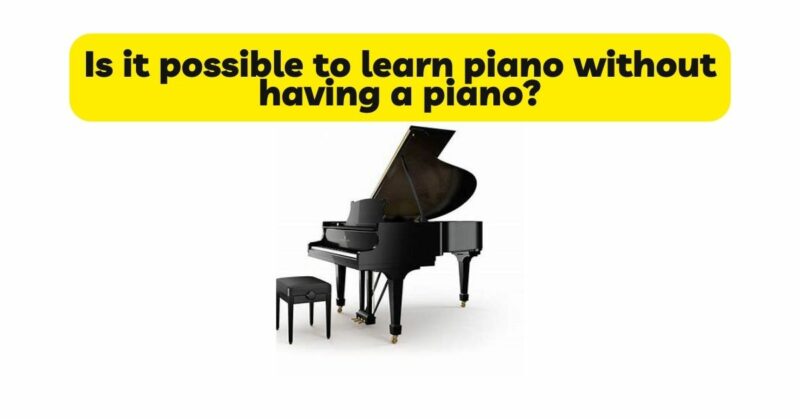Learning to play the piano is a captivating journey that requires dedication, practice, and access to a piano. However, circumstances may arise where obtaining a piano is challenging or temporarily not feasible. In such situations, aspiring pianists often wonder if it is possible to learn piano without having a physical instrument. In this article, we will explore various strategies, techniques, and resources that can facilitate piano learning in the absence of a piano, enabling individuals to continue their musical education and make progress until they have access to an instrument.
- Developing Musical Knowledge and Theory: One aspect of piano learning that can be pursued without a physical piano is the development of musical knowledge and theory. Use this time to deepen your understanding of music fundamentals such as reading sheet music, learning key signatures, understanding time signatures, and studying music theory concepts like scales, chords, and intervals. There are numerous online resources, books, and instructional materials available that can aid in your exploration of music theory.
- Ear Training and Listening Skills: Another valuable area to focus on when learning piano without a physical instrument is ear training and listening skills. Develop your ability to recognize different musical intervals, chord progressions, and melodies by actively listening to various genres of music. Engage with music through critical listening, identifying different instruments, analyzing harmonies, and honing your ability to reproduce melodies and chords vocally or on a virtual piano app. This exercise will enhance your musical ear and provide a foundation for future piano playing.
- Virtual Piano Apps and Software: In the absence of a physical piano, virtual piano apps and software can serve as valuable learning tools. These applications provide a simulated piano keyboard on your computer, tablet, or smartphone, allowing you to practice fingerings, scales, and simple melodies. Virtual piano apps often come with features like built-in lessons, interactive exercises, and visual representations of music notation. While they cannot fully replicate the tactile experience of playing a real piano, they can help maintain finger dexterity and reinforce musical concepts.
- Music Theory Exercises and Worksheets: Engaging with music theory exercises and worksheets can be an effective way to continue your piano education without access to an instrument. There are numerous online resources and books available that provide music theory exercises, drills, and worksheets that can be completed without a piano. These materials focus on topics such as note reading, rhythm, scales, chords, and music analysis. Completing these exercises will strengthen your theoretical understanding and set a solid foundation for future piano playing.
- Mental Practice and Visualization: While physical practice may not be possible without a piano, mental practice and visualization can still contribute to your progress as a pianist. Mental practice involves mentally rehearsing pieces, visualizing finger movements, and imagining the sound and sensation of playing the piano. This technique has been used by professional musicians to reinforce muscle memory, refine technique, and solidify musical interpretation. By engaging in mental practice regularly, you can maintain a strong connection to the music and reinforce your understanding of piano playing.
- Music Appreciation and Analysis: In the absence of hands-on piano practice, focusing on music appreciation and analysis can deepen your understanding of different styles, genres, and composers. Listen to recordings of famous piano performances and analyze the interpretations, dynamics, and expression. Study the works of renowned composers and read about their lives and contributions to music. This exploration will expand your musical horizons, enhance your ability to interpret and understand piano music, and serve as a source of inspiration for future piano playing.
- Seek Opportunities for Observation and Inspiration: Even without a piano, opportunities for observation and inspiration can fuel your passion for piano playing. Attend live piano performances, either in-person or through virtual platforms, to witness the artistry and techniques of skilled pianists. Observe their fingerings, hand positions, and interpretive choices. Watch instructional videos, documentaries, and masterclasses featuring renowned pianists to gain insights into their approach to piano playing. Engaging with these resources will provide valuable knowledge and keep your motivation alive until you have access to an instrument.
Conclusion: Learning piano without having a physical instrument presents unique challenges, but it is possible to continue your musical education and make progress through various strategies, techniques, and resources. Focusing on developing musical knowledge and theory, ear training and listening skills, utilizing virtual piano apps and software, engaging with music theory exercises, practicing mental practice and visualization, exploring music appreciation and analysis, and seeking opportunities for observation and inspiration are effective ways to maintain your connection to piano playing. Remember that these activities serve as valuable groundwork, preparing you for future hands-on practice when access to a piano becomes available. Stay dedicated, seek out learning opportunities, and keep your passion for piano playing alive as you await the moment to experience the joy of playing on a physical instrument.


